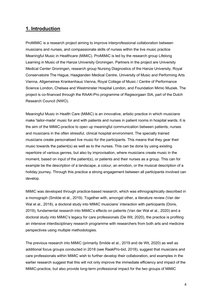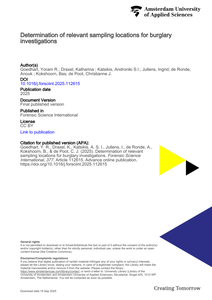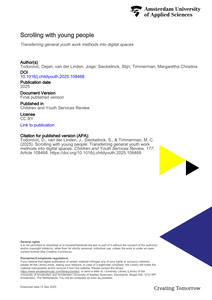This paper puts forward a conceptual framework to analyse emergence and the development of planned knowledge locations in cities (science and technology parks, creative factories, knowledge hubs, etc.). It argues that the study and the practice of developing these precincts can benefit from explicitly considering the broader territorial context, the time dynamics and the co-evolutionary processes through which they unfold. The advantages of such as framework are illustrated with the support of two European knowledge locations: Arabianranta (Helsinki, Finland) and Biocant (Cantanhede, Portugal).
DOCUMENT

Post-war urban neighbourhoods in industrialised countries have been shown to negatively affect the lifestyles of their residents due to their design. This study aims at developing an empirical procedure to select locations to be redesigned and the determinants of health at stake in these locations, with involvement of residents’ perspectives as core issue. We addressed a post-war neighbourhood in the city of Groningen, the Netherlands. We collected data from three perspectives: spatial analyses by urban designers, interviews with experts in local health and social care (n = 11) and online questionnaires filled in by residents (n = 99). These data provided input for the selection of locations to be redesigned by a multidisciplinary team (n = 16). The procedure yielded the following types of locations (and determinants): An area adjacent to a central shopping mall (social interaction, traffic safety, physical activity), a park (experiencing green, physical activity, social safety, social interaction) and a block of low-rise row houses around a public square (social safety, social interaction, traffic safety). We developed an empirical procedure for the selection of locations and determinants to be addressed, with addressing residents’ perspectives. This procedure is potentially applicable to similar neighbourhoods internationally.
DOCUMENT

This document consists of the research report of Work Package 3 of ProMiMiC's locations Groningen and The Hague. Through the implementation of MiMiC-projects in the form of ‘living labs’, research data was generated leading to insights into (1) concepts of interprofessionality between musicians and healthcare professionals, (2) effects of the MiMiC-practice on nurses’ compassionate skills in contact with patients and (3) the influence of the various contexts on the MiMiC-practice. Given the fact that hospitals are the site of study in ProMiMiC, the research activities of Work Package 3 got highly affected by the COVID-19 pandemic. It led to additional questions and expansion of the MiMiC practice to directions that the consortium hadnot foreseen.--- Update September 2025: Chapter 5 - episodes added as a separate file for open access.
DOCUMENT

The pervasive use of media at current-day festivals thoroughly impacts how these live events are experienced, anticipated, and remembered. This empirical study examined event-goers’ live media practices – taking photos, making videos, and in-the-moment sharing of content on social media platforms – at three large cultural events in the Netherlands. Taking a practice approach (Ahva 2017; Couldry 2004), the author studied online and offline event environments through extensive ethnographic fieldwork: online and offline observations, and interviews with 379 eventgoers. Analysis of this research material shows that through their live media practices eventgoers are continuously involved in mediated memory work (Lohmeier and Pentzold 2014; Van Dijck 2007), a form of live storytelling thatrevolves around how they want to remember the event. The article focuses on the impact of mediated memory work on the live experience in the present. It distinguishes two types of mediatised experience of live events: live as future memory and the experiential live. The author argues that memory is increasingly incorporated into the live experience in the present, so much so that, for many eventgoers, mediated memory-making is crucial to having a full live event experience. The article shows how empirical research in media studies can shed new light on key questions within memory studies.
MULTIFILE

Residential burglaries often go unsolved, as collected DNA traces and fingermarks frequently originate from residents rather than the offender. It is therefore important to know how to target sampling locations that specifically relate to the burglary event. However, data that aid in assessing the likelihood of a burglar touching certain surfaces, and, consequently leaving trace evidence, is unavailable. Instead, forensic examiners rely primarily on their personal experience and expertise to determine where burglary-related traces are most likely to be found.The current study aims to identify specific areas that are contacted during different types of interactions with points of entry. An experiment was conducted at a Dutch music festival, where participants simulated both a legitimate and burglary scenario. Using paint, the points of contact between the participants’ hands and the experimental set-up were recorded. The contact locations of all participants were combined using heatmaps to reveal the patterns of contact. We found that different burglary methods lead to distinct contact patterns, indicating specific areas where traces are most likely to be deposited. Our findings can support forensic examiners in making evidence-based decisions during search strategies in burglary investigations.
MULTIFILE

On a four-year bachelor course at Inholland University of Applied Sciences in the Netherlands, additional modern language was offered to first-year students studying at three locations. Since each location only had a few students and there was only one language teacher available, across the three locations, lessons were given by the teacher in a ‘hybrid’ classrooms. The teacher was at one location with some students while students from the other two locations would join via live video link. The focus was to develop speaking and listening skills through in-classroom discussion that took place via the video link. Short video news segments in the language were watched live in class. This lead to discussion and practicing the language. Learning support materials were available in the form of a grammar book with an online self-test learning environment. The research group conducted research on this original and creative solution to teaching smaller groups since much could be learned from a practical, didactic and organisational perspective. Several organisational issues influenced the course. And from a pedagogical perspective, this case supported findings from the literature that it is complicated to engage with students live in a classroom while also communicating with students at other locations via a video screen.
DOCUMENT

Purpose: This conceptual paper explores the problems associated with trying to address culture as one of the key aspects in effective workplace strategies. Design/methodology/approach: This paper critically addresses the relationship between workplace strategies and the behavioural components of locality. It reviews the role that the concept of culture has, so far, played in trying to predict these behavioural consequences as part of (literature discussing) efforts to design appropriate workplace strategies. Findings: The discussion reveals the need to further address this relation through dedicated research. What is more, it is argued that there is a clear need to focus explicitly on work patterns, and how these can be accounted for in workplace strategies, instead of continuing to focus on the concept of culture as a predictor for successfulness. It is argued that the latter does not allow for practical application, whereas the former could help us to better understand and predict the effectiveness of specific workplace strategies in specific (local) circumstances. Practical implications: The outcome of the discussion suggests that organisations consisting of multiple locations could benefit from explicitly accounting for (local) work patterns in setting up workplace strategies for the organisation as a whole. Originality/value: This paper reveals a relevant research gap in current literature on workplace strategies and suggests a shift in focus from culture to work patterns as one of the key aspects to address.
LINK
Purpose: This paper aims to define the influence of the physical and social dimensions of the work environment on knowledge productivity of academics in Dutch Universities of Applied Sciences.Design/methodology/approach: Literature review; a multiple case study based on literature review (6 cases); a survey (n=188).Findings: Knowledge workers share two basic needs: their productivity requires isolation (internalization of knowledge) and interaction (externalization of knowledge), supported by different spatial concepts. None of the work environments involved in the study adequately support all of the phases in the knowledge development process adequately. Collective productivity is primarily determined by the physical dimension of the workplace; whereas the social dimension is crucial for personal productivity. Social interaction has a stronger effect than distraction; and the layout has a stronger effect than comfort.Conclusions - A high performance workplace supports both externalization and internalization of knowledge, allowing group members to collaborate and communicate according to need. More traditional work environments support internalization; innovative workplace designs (the office as meeting place) are more suited to support interaction and collaboration. Discover why freedom of choice is the key.Recommendations - Academics should be allowed to choose as to how, where and when they work and involved during the development of new concepts.Paper type: Research paper
MULTIFILE

Due to the rise of knowledge work since the 1980s, high job autonomy and high task variety have become common job characteristics. Knowledge workers increasingly work across multiple locations, using advanced information and communication technologies; a trend that is expected to accelerate in the post-COVID-19 world of work. As these developments fundamentally change the use of office work environments, organizations and workplace professionals have been searching for new ways to facilitate the workforce more effectively and efficiently. In the past two decades, more and more of them seem to have found the ultimate solution in activity-based working (ABW). According to this concept, workers share a variety of non-assigned work settings, enabling them to use different work settings in accordance with their varying tasks. Yet, outcomes of AWB environments generally fall short of expectations. Remarkably, while sharing the same ABW environment, some workers seem to experience fit while others do not.Optimization of perceived fit with ABW environments is important fororganizations, since it is linked to various work outcomes. Currently, this isparticularly relevant in the context of expected post-COVID-19 changes in workpractices. To find clues for optimization of ABW practice, the current PhD research project was designed to examine how workers’ jobs, tasks, behaviors, psychological needs, and demographic characteristics may be related to their perceived fit. Two survey-based studies revealed relevant workers’ attributes, which were further examined in experience-sampling field studies and a virtual reality experiment. From the findings, a clear profile arises of workers who best fit with ABW environments, i.e.: high task variety, job autonomy, external and internal mobility, social interaction, and need for relatedness; low need for privacy; few highcomplexity tasks, many non-individual tasks; appropriately using open and closed work settings; frequently switching between work settings; relatively young age.
DOCUMENT

With the increasing significance of the online lifeworld in the lives of adolescents, youth work must adapt its methods to support young people’s personal development and social participation in this hybrid online space. To date, there is limited knowledge on how youth workers can effectively employ methodical actions in the online environment. This paper draws on established offline youth work methods to explore their potential transferability to the online context. The research question guiding this study is: How can offline youth work methods be used in the online lifeworld to support adolescents’ developmental needs? Using the Change Laboratory method, 26 youth workers from 14 youth work organisations in the Netherlands participated in this research. The findings suggest that while offline methods provide a valuable resource, they cannot be directly transferred to the online context without adaptation. Instead, they offer a framework for seven specific methodical actions that can be adapted or developed for the online context. They are: 1) Increasing online visibility and accessibility, 2) Orienting, 3) Signalling, 4) Making contact, 5) Building meaningful relationships, 6) Assessing needs, and 7) Providing support. By identifying these seven methodical actions which are crucial for addressing the developmental needs of adolescents online, this paper contributes to the growing body of knowledge on youth work in the online lifeworld.
DOCUMENT
